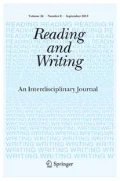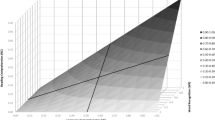Abstract
The present study sought to clarify the relations amongst serial decoding, irregular word recognition, listening comprehension, facets of oral vocabulary and reading comprehension in two cohorts of children differing in reading level. In the process, the components of the simple view of reading were evaluated. Students in grades 1 (n = 67) and 6 (n = 56) were assessed on measures of phonological awareness, decoding, irregular word recognition, listening comprehension, oral vocabulary, and reading comprehension. Even when all other measures were controlled, vocabulary was found to explain reading comprehension in grade 6 but not grade 1. Vocabulary also predicted decoding in grade 6 and irregular word recognition in both grades. These results are interpreted as supporting a not-so-simple view of the constructs underlying reading comprehension that acknowledges complex connections between print skills and oral language.
Similar content being viewed by others
Notes
The same pattern of results was found if the decoding composite was replaced with only the WRMT Word Attack score.
References
Adams, M. J., & Huggins, A. W. F. (1985). The growth of children’s sight vocabulary: A quick test with educational and theoretical implications. Reading Research Quarterly, 20, 262–279.
Beck, I. L., McKeown, M. G., & Kucan, L. (2002). Bringing words to life; Robust vocabulary instruction. New York, NY: Guildford Press.
Biemiller, A., & Boote, C. (2006). An effective method for building meaning vocabulary in primary grades. Journal of Educational Psychology, 98, 44–62.
Braze, D., Tabor, W., Shankweiler, D. P., & Mencl, W. E. (2007). Speaking up for vocabulary: Reading skill differences in young adults. Journal of Learning Disabilities, 40, 226–244.
Cain, K., & Oakhill, J. (1999). Inference making ability and its relation to comprehension failure in young children. Reading and Writing: An Interdisciplinary Journal, 11, 489–503.
Cain, K., Oakhill, J., & Bryant, P. (2004). Children’s reading comprehension ability: Concurrent prediction by working memory, verbal ability and component skills. Journal of Educational Psychology, 96, 31–42.
Coltheart, M. (2005). Modeling reading: The dual-route approach. In M. J. Snowling & C. Hulme (Eds.), The science of reading: A handbook (pp. 6–23). Oxford, England: Blackwell.
Cunningham, A., & Stanovich, K. (1991). Tracking the unique effects of print exposure in children: Associations with vocabulary, general knowledge and spelling. Journal of Educational Psychology, 83, 264–274.
Dunn, L., & Dunn, L. (2006). Peabody picture vocabulary test—4. Circle Pins, MN: American Guidance Service.
Ehri, L. (2005). Learning to read: Theory, findings and issues. Scientific Studies of Reading, 9, 167–188.
Gough, P., & Tunmer, W. (1986). Decoding, reading and reading disability. Remedial and Special Education, 7, 6–10.
Hagtvet, B. (2003). Listening comprehension and reading comprehension in poor decoders: Evidence for the importance of syntactic and semantic skills as well as phonological skills. Reading and Writing: An Interdisciplinary Journal, 16, 505–539.
Harm, M., & Seidenberg, M. (2004). Computing the meanings of words in meaning: Cooperative division of labor between visual and phonological processes. Psychological Review, 111, 662–720.
Hoover, W., & Gough, P. B. (1990). The simple view of reading. Reading and Writing: An Interdisciplinary Journal, 2, 127–160.
Johnston, T. C., & Kirby, J. R. (2006). The contribution of naming speed to the simple view of reading. Reading and Writing: An Interdisciplinary Journal, 19, 339–361.
Kirby, J. R., & Savage, R. S. (2008). Can the simple view deal with the complexities of reading? Literacy, 42, 75–82.
Landi, N., & Perfetti, C. (2007). An electrophysiological investigation of semantic and phonological processing in skilled and less-skilled comprehenders. Brain and Language, 102, 30–45.
Muter, V., Hulme, C., Snowling, M., & Stevenson, J. (2004). Phonemes, rimes, vocabulary, and grammatical skills as foundations of early reading development: Evidence from a longitudinal study. Developmental Psychology, 40, 665–681.
Nation, K., & Snowling, M. (1998). Semantic processing and the development of word-recognition skills: Evidence from children with developmental reading comprehension difficulties. Journal of Memory and Language, 39, 85–101.
Nation, K., & Snowling, M. (1999). Developmental differences in sensitivity to semantic relations among good and poor comprehenders: Evidence from semantic priming. Cognition, 90, B1–B13.
Nation, K., & Snowling, M. (2004). Beyond phonological skills: Broader language skills contribute to the development of reading. Journal of Research in Reading, 27, 342–356.
Oakhill, J., Cain, K., & Bryant, P. (2003). The dissociation of word reading and text comprehension: Evidence from component skills. Language and Cognitive Processes, 18, 443–468.
Ouellette, G. (2006). What’s meaning got to do with it: The role of vocabulary in word reading and reading comprehension. Journal of Educational Psychology, 98, 554–566.
Perfetti, C. (2007). Reading ability: Lexical quality to comprehension. Scientific Studies of Reading, 11, 357–383.
Perfetti, C., & Hart, L. (2002). The lexical quality hypothesis. In L. Verhoeven, C. Elbrow, & P. Reitsma (Eds.), Precursors of functional literacy (Vol. 11, pp. 67–86). Amsterdam: John Benjamins.
Protopapas, A., Sideridis, G., & Mouzaki, A. (2007). Development of lexical mediation in the relationship between reading comprehension and word reading skills in Greek. Scientific Studies of Reading, 11, 165–197.
Ricketts, J., Nation, K., & Bishop, D. (2007). Vocabulary is important for some, but not all reading skills. Scientific Studies of Reading, 11, 235–257.
Savage, R. (2006). Reading comprehension is not always the product of decoding and listening comprehension: Evidence from teenagers who are very poor readers. Scientific Studies of Reading, 10, 143–164.
Seidenberg, M., & McClelland, J. (1989). A distributed, developmental model of word recognition and naming. Psychological Review, 96, 523–568.
Semel, E., Wiig, E., & Secord, W. (2003). Clinical evaluation of language fundamentals—fourth edition (CELF-4). San Antonio, TX: Psychological Corporation.
Senechal, M., Ouellette, G., & Rodney, D. (2006). The misunderstood giant: On the predictive role of early vocabulary to future reading. In S. B. Neuman & D. Dickinson (Eds.), Handbook of early literacy research (Vol. 2). New York, NY: Guilford Press.
Share, D. (1995). Phonological recoding and self-teaching: Sine qua non of reading acquisition. Cognition, 55, 151–218.
Storch, S., & Whitehurst, G. (2002). Oral language and code-related precursors to reading: Evidence from a longitudinal structural model. Developmental Psychology, 38, 934–947.
Tannenbaum, K. R., Torgesen, J. K., & Wagner, R. K. (2006). Relationships between word knowledge and reading comprehension in their-grade children. Scientific Studies of Reading, 10, 381–398.
Torgesen, J., Wagner, R., & Rashotte, C. (1999). Test of word reading efficiency. Austin, TX: Pro-Ed.
Vellutino, F. R., Tunmer, W. E., Jaccard, J. J., & Chen, R. (2007). Components of reading ability: Multivariate evidence for a convergent skills model of reading development. Scientific Studies of Reading, 11, 3–32.
Verhoeven, L., & van Leeuwe, J. (2008). Prediction of the development of reading comprehension: A longitudinal study. Applied Cognitive Psychology, 22, 407–423.
Wagner, R., Torgeseon, J., & Rashotte, C. (1999). TOWRE: Test of word reading efficiency. Austin, TX: Pro-Ed, Inc.
Walley, A., Metsala, J., & Garlock, V. (2003). Spoken vocabulary growth: Its role in the development of phonological awareness and early reading ability. Reading and Writing: An Interdisciplinary Journal, 16, 5–20.
Wiig, E., & Secord, W. (1992). TOWK: Test of word knowledge. Toronto, Canada: Psychological Corporation.
Woodcock, R. (1998). WRMT-R: Woodcock reading mastery tests—revised. Circle Pines, MN: American Guidance Services.
Acknowledgements
This research was funded in part by a grant to the first author from the Social Sciences and Humanities Research Council of Canada (SSHRC). We sincerely thank the children, parents, teachers, administrators and school personnel of NB District 2. We also acknowledge the helpful comments of a reviewer that served to highlight the distinction between constructs and measures discussed here. We also thank Jill Fraser and Angela Dalton for their help and support and Katrina Ouellette for overseeing all things lab related.
Author information
Authors and Affiliations
Corresponding author
Appendices
Appendix A
Appendix B
Rights and permissions
About this article
Cite this article
Ouellette, G., Beers, A. A not-so-simple view of reading: how oral vocabulary and visual-word recognition complicate the story. Read Writ 23, 189–208 (2010). https://doi.org/10.1007/s11145-008-9159-1
Received:
Accepted:
Published:
Issue Date:
DOI: https://doi.org/10.1007/s11145-008-9159-1




